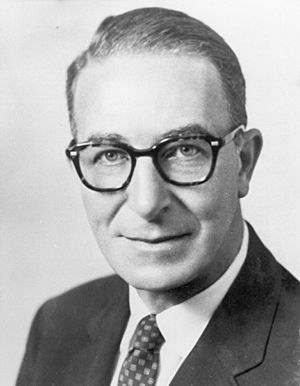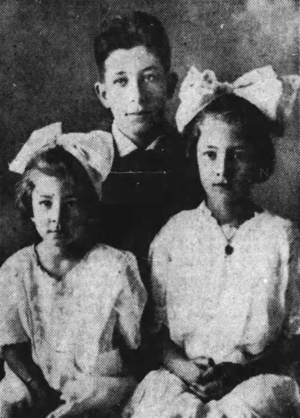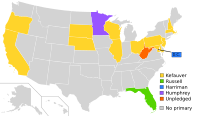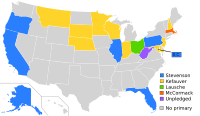Estes Kefauver facts for kids
Quick facts for kids
Estes Kefauver
|
|
|---|---|

Official portrait, 1956
|
|
| United States Senator from Tennessee |
|
| In office January 3, 1949 – August 10, 1963 |
|
| Preceded by | Tom Stewart |
| Succeeded by | Herbert S. Walters |
| Member of the U.S. House of Representatives from Tennessee's 3rd district |
|
| In office September 13, 1939 – January 3, 1949 |
|
| Preceded by | Sam D. McReynolds |
| Succeeded by | James B. Frazier Jr. |
| Personal details | |
| Born |
Carey Estes Kefauver
July 26, 1903 Madisonville, Tennessee, U.S. |
| Died | August 10, 1963 (aged 60) Bethesda, Maryland, U.S. |
| Political party | Democratic |
| Spouse |
Nancy Patterson Pigott
(m. 1935) |
| Children | 4 |
| Education | University of Tennessee (BA) Yale University (LLB) |
Carey Estes Kefauver (July 26, 1903 – August 10, 1963) was an American politician from Tennessee. He was a member of the Democratic Party. He served in the U.S. House of Representatives from 1939 to 1949. Then, he served in the Senate from 1949 until his death in 1963.
Kefauver became famous for leading a big investigation into organized crime in the early 1950s. He tried twice to become his party's choice for President of the United States. In 1956, he was chosen to be the running mate for presidential candidate Adlai Stevenson. Even though they lost the election, Kefauver kept his Senate seat. He later led the U.S. Senate Antitrust and Monopoly Subcommittee, working to make sure businesses competed fairly.
Contents
Early Life and Education
Carey Estes Kefauver was born in Madisonville, Tennessee. His father, Robert Cooke Kefauver, owned a hardware store. His mother was Phredonia Bradford Estes. Estes learned about politics early because his father was the mayor of their town. His father was always a big help in his son's political campaigns.
Estes went to the University of Tennessee and earned a bachelor's degree in 1924. He played football for his college team. After college, he taught math and coached football at a high school in Arkansas for a year. Then, he went to Yale Law School and earned a law degree in 1927. He graduated with high honors.
Kefauver worked as a lawyer in Chattanooga for 12 years. In 1935, he married Nancy Pigott. She was an artist from Scotland. Nancy worked hard to support her husband's campaigns. They raised four children, including one they adopted.
Kefauver became interested in local politics while working as a lawyer. He tried to get elected to the Tennessee Senate in 1938 but lost. In 1939, he worked for the new governor for two months. Later that year, when Congressman Sam D. McReynolds died, Kefauver was elected to take his place in the House of Representatives.
Kefauver in Congress
Serving in the House of Representatives
Estes Kefauver was elected to the House of Representatives five times as a Democrat. During President Franklin D. Roosevelt's time, Kefauver supported the "New Deal" laws. These laws were government programs designed to help people during tough economic times. Most other Tennessee Democrats were more conservative, but Kefauver stood out.
He strongly supported the Tennessee Valley Authority (TVA). The TVA was a big project that brought electricity and development to the Tennessee Valley. Kefauver successfully stopped Senator Kenneth McKellar from gaining political control over the TVA.
In the House, Kefauver worried about big companies having too much power. He worked on laws to reform Congress and prevent monopolies. A monopoly is when one company controls an entire industry. He led the House Select Committee on Small Business, which looked into how big businesses were affecting the U.S. economy. He also tried to close loopholes in the Clayton Antitrust Act, a law meant to prevent monopolies.
Kefauver suggested giving more money and staff to government groups that fight monopolies. He also wanted new laws to make it easier to go after big corporations. He believed people should know more about the dangers of monopolies.
In the mid-1950s, Kefauver investigated how television might affect juvenile delinquency (young people committing crimes). This led to a bigger investigation in the early 1960s. People were worried that violent TV shows might be linked to violence among young people.
Kefauver's modern views put him against E. H. Crump. Crump was a powerful political boss in Tennessee. When Kefauver ran for the U.S. Senate in 1948, Crump and his friends attacked him. They called him a "fellow traveler" and said he worked for "communists."
Kefauver responded in a televised speech in Memphis. He put on a coonskin cap and said, "I may be a pet coon, but I'm not Boss Crump's pet coon." He won the election, defeating the current Senator Tom Stewart. After that, the coonskin cap became his symbol. His victory helped weaken Crump's political power in Tennessee.
Once in the Senate, Kefauver became known for fighting for consumer protection and antitrust laws. He wanted to protect everyday people from unfair business practices. He also supported civil rights generally, even though he struggled with the idea of racial integration at first. He was a strong supporter of labor unions and other groups seen as modern in the South at that time.
Serving in the Senate
Working for Fair Business Practices
After becoming a U.S. Senator in 1948, Kefauver helped pass the Celler–Kefauver Act in 1950. This law made it harder for big companies to buy out their competitors. From 1957 to 1963, his Senate Antitrust and Monopoly Subcommittee studied how big industries like steel, cars, and medicine set prices. They found that in many large U.S. industries, there wasn't much real price competition. The committee even suggested breaking up General Motors into smaller, competing companies.
Kefauver's subcommittee also held hearings on the pharmaceutical (drug) industry. These hearings, from 1959 to 1963, led to his most famous law: the Kefauver-Harris Drug Act of 1962. Kefauver was shocked by how much profit drug companies were making from American consumers.
Before this law, the U.S. Food and Drug Administration (FDA) had limited power to check if drugs actually worked or to make companies share risks. Kefauver's ideas were not popular with everyone. Some said he was giving the government too much power and interfering with doctors and patients. His law seemed unlikely to pass. However, in late 1961, doctors found that a drug called thalidomide caused severe birth defects. This drug had been widely sold to pregnant women. This discovery helped Kefauver's bill pass into law.
Kefauver's views often made him unpopular with his own party in Tennessee. In 1956, he and two other Southern senators were the only ones who did not sign the "Southern Manifesto." This document opposed racial integration. Because of his independent views, some people in Congress disliked him. One person even called him "the most hated man in Congress."
The Kefauver Committee and Organized Crime
In 1950, Kefauver led a special Senate committee to investigate organized crime. This committee was known as the Kefauver committee or the Kefauver hearings. They held hearings in 14 cities and listened to over 600 witnesses. Many witnesses were famous crime bosses like Willie Moretti and Frank Costello. Costello became famous for refusing to show his face on camera and then walking out of the hearing. Several politicians also appeared before the committee, and their careers were ruined.
The committee's hearings were shown live on television. Many Americans were just starting to buy TVs, so these hearings made Kefauver nationally famous. They also introduced many Americans to the idea of the Mafia. In 1951, Kefauver even appeared as a guest on a TV game show called What's My Line? to talk about the hearings. This shows how popular they were.
Presidential Campaigns
In the 1952 presidential election, Kefauver ran for the Democratic Party's presidential nomination. He campaigned wearing his coonskin cap. He won a big victory in the New Hampshire primary, even beating the sitting President, Harry S. Truman. After this, Truman decided not to run for re-election.
Kefauver won 12 out of 15 primary elections in 1952. He received many more votes than Adlai Stevenson, who eventually became the Democratic nominee. However, at that time, primary wins did not guarantee the nomination. Party leaders had a lot of say. Even though Kefauver was ahead, he lost the nomination to Stevenson. Stevenson was chosen by party leaders, even though he had not actively campaigned. Stevenson lost the main election to Dwight D. Eisenhower.
In 1956, Kefauver tried again for the Democratic presidential nomination. He won primaries in New Hampshire, Minnesota, and Wisconsin. It looked like he might repeat his success from four years earlier. But this time, he faced stronger competition from Stevenson and Governor W. Averell Harriman of New York.
Stevenson received more support and raised more money. He beat Kefauver in key primaries like Oregon, Florida, and California. After losing badly in California, Kefauver stopped his campaign. At the Democratic National Convention, Stevenson was nominated for president again.
Stevenson then let the delegates choose his vice-presidential running mate. Even though Stevenson preferred John F. Kennedy, he didn't try to influence the vote. Kefauver eventually received the nomination for vice president. However, Stevenson and Kefauver lost the November election to Eisenhower by an even larger margin than in 1952.
Later Career and Achievements
After his 1956 defeat, Kefauver was considered a top candidate for the 1960 Democratic nomination. To get more attention, he suggested a federal ban on switchblade knives in 1957. He held hearings on this law at the same time that magazines were publishing scary stories about switchblades and youth gangs. At each hearing, he would show off different knives. However, his switchblade bill did not pass, partly because of bad feelings between him and other senators. In 1959, he decided not to run for president a third time.
Kefauver continued to serve Tennessee in the U.S. Senate. Giving up his presidential dreams led to his most productive years as a senator. He might have faded from the public eye, but he earned the respect of other lawmakers. They admired his independence and his work on important laws.
When he ran for re-election in 1960, he faced strong opposition. This was because he had refused to sign the 1956 "Southern Manifesto" and had voted for the Civil Rights Acts of 1957 and 1960. These acts aimed to protect voting rights for all citizens. Despite this, he won the Democratic primary easily and then won the general election by a large margin.
Kefauver voted for the 24th Amendment, which banned poll taxes. In 1962, he introduced the Kefauver-Harris Drug Control Act. This bill, which he called his "finest achievement" in consumer protection, became law. It required drug companies to tell doctors about side effects. It also allowed generic versions of drugs to be sold after a patent expired. Most importantly, it made drug companies prove their products were effective and safe.
When President John F. Kennedy signed the Kefauver-Harris Drug Control Act, he thanked Senator Kefauver. He said Kefauver's long hearings helped create a very effective law when it was needed most.
Death and Legacy
On August 8, 1963, Kefauver had a heart attack while speaking in the Senate. He was trying to add a rule to a NASA funding bill. This rule would have made companies that benefited from NASA research pay back some of the costs. Two days later, on August 10, 1963, Kefauver died in his sleep from a ruptured blood vessel.
After a memorial service, his body was taken to his hometown of Madisonville. Thousands of people came to pay their respects. He was buried in a family cemetery near his home.
There was talk that his wife, Nancy Kefauver, might run for his Senate seat. But she decided not to. The governor of Tennessee appointed Herbert S. Walters to the seat instead. In November 1963, President Kennedy named Nancy Kefauver to lead a new program called the Art in Embassies Program. This was Kennedy's last appointment before his own death. Nancy Kefauver never remarried, saying she "had too perfect a marriage."
The federal courthouse in Nashville, Tennessee, was renamed the Estes Kefauver Federal Building and United States Courthouse in his honor. One of the libraries at the University of Tennessee is also named for him, and his important papers are kept there. One of the city parks in Madisonville, Tennessee, is also named Kefauver Park.
Images for kids
See also
 In Spanish: Estes Kefauver para niños
In Spanish: Estes Kefauver para niños
 | Victor J. Glover |
 | Yvonne Cagle |
 | Jeanette Epps |
 | Bernard A. Harris Jr. |





